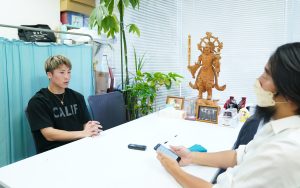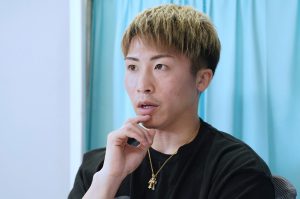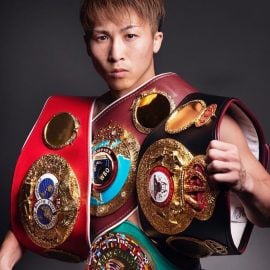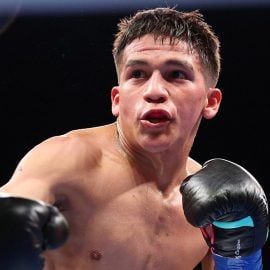Naoya Inoue Q&A – Part Two: Stephen Fulton, future plans and challenges

Editor’s Note: This interview was conducted before Oleksandr Usyk regained the No. 1 spot in The Ring’s pound-for-pound rankings.
Read Part One of this KO Magazine-style Q&A here.

Naoya Inoue welcomed Ring correspondent Daisuke Sugiura to his gym for an exclusive interview. Photo by Naoki Fukuda
Ring Ratings Panelist and veteran sports writer Daisuke Sugiura recently returned to his homeland where he sat down with Japan’s biggest boxing star, Ring/WBC/WBA/IBF bantamweight champion Naoya Inoue, for an exclusive interview at the three-division titleholder’s gym.
Inoue (23-0, 20 KOs), currently No. 2 in The Ring’s pound-for-pound rankings, discussed moving up to the junior featherweight division, a future ring clash with WBO/WBC 122-pound titleholder Stephen Fulton, facing (and training with) African-American fighters, sparring stories about featherweight standout Leigh Wood, his broadcast deal with Amazon Prime, and how long he wants to continue boxing.
Of the possibility of facing Fulton, The Ring’s No. 1-rated junior featherweight, Inoue stated:
“If we fight each other, I think it will be a great technical battle. It won’t be an easy fight. Fulton has a long reach, and I think it’s about how (well I close the) distance.”
RingTV (RTV): In terms of weight, you said that junior featherweight is probably the best fit for you at this moment. Is that what you feel in the process of losing weight?
Naoya Inoue (NI): I’ve been feeling it for a while now. At 122 pounds, I can move more, and I think I can demonstrate my strength more. However, that’s just me being able to move better (and be more active). I don’t know how much damage I can do to opponents who should be naturally bigger. It will be an unknown world.
RTV: In the past, you have demonstrated a power that seemed to be more dominant as you moved up to the 115- and 118-pound divisions. What do you think was the reason?

Inoue, who turned pro at 108 pounds, admits to have lost too much weight in past bouts. Photo by Naoki Fukuda
NI: Of course, I didn’t have to lose as much weight and that was huge. It might be that Japanese boxers, myself included, generally lose too much weight (fighting in unnaturally light weight classes), so as we move up the weight class, our power increases. I also feel that if I move up to 122, my power will still increase, and I can hit harder. Featherweight is probably my limit, (at that weight) my body will be heavy, so my speed will drop.
RTV: What is your impression of the two 122-pound champs – Murodjon Akhmadaliev and Stephen Fulton? Which one is likely to be your target when you move up?
NI: I haven’t watched much of Akhmadaliev yet, only a few highlights here and there. He has solid technique and is a strong fighter. I can see that he had a formidable amateur career supported by the Uzbekistan system.
RTV: How about Fulton?
NI: I watched the Fulton-Brandon Figueroa fight. Fulton is a technical fighter. He can keep his distance very well. I only watched one of his fights and I don’t think the Figueroa fight was his best, so I’d rather not say much more. If we fight each other, I think it will be a great technical battle. It won’t be an easy fight. Fulton has a long reach, and I think it’s about how (well I close) the distance.
RTV: You have never faced a black American fighter in your pro career. Have you had any sparring with them?
NI: I haven’t sparred with any black fighters yet either. That’s also an unknown area for me. The black athletes tend to be physically strong. I’d love to fight them and feel their athleticism.
RTV: Was there any fighter you thought was really good or strong?
NI: I don’t think there’s anyone I was that impressed with throughout a fight. The first round against Emmanuel Rodriguez in Glasgow, I was like, “Wow (this guy is good)”. From the first round to the 12th round, the only fight when I really had a hard time was the first one against Donaire, but it was more about suffering from the eye injury.
RTV: The same question again, but including the fighters you faced in sparring sessions and amateur fights?

The toughest sparring partner Inoue could think of is Ring’s No. 6-rated featherweight Leigh Wood. Photo by Naoki Fukuda
NI: Nothing particular comes to my mind, but Leigh Wood, the current WBA featherweight titleholder whom I sparred with before the Jamie McDonnell fight, had tremendous punching power. Wood is a natural featherweight, and his weight was probably much higher than the featherweight limit when I sparred with him. He was big and probably because of that, I really felt his power and strength.
RTV: Are you looking forward to moving up in weight and competing against stronger and more durable fighters? Do you feel anxious at the same time?
NI: I guess I will feel both. How do I maintain my composure when the future opponents endure my punching power? Right now, the opponent’s expression changes every time I land a punch, but when I move up in weight, they might be able to withstand punches that would normally knock down bantamweights. How do I stay calm when things don’t go my way? I think it’s gonna be fun, but it could be worrisome too.
RTV: Is it also an opportunity to show something you haven’t shown before?
NI: Yes, maybe I will finally be able to show everything I have then.
RTV: Is the best punch you’ve ever thrown so far the right hand that knocked Juan Carlos Payano out cold?
NI: Indeed. I couldn’t throw a perfect punch like that even in practice. It was a perfect punch, not “close to perfect” or “almost perfect.” They say that “persistence pays off.” If you make efforts and continue doing that, I think there might come a time when you even surpass your ability. It was a punch that I was only able to throw when I was really sharpened and had a sense that I don’t usually have. I saw a single light in the ring, and just followed it.
RTV: After moving up to 122, the matchmaking could be difficult because of promotional issues. Are you going to assert your wishes to some extent? Or will you leave it to the team?
NI: I will say who I’d like to fight, what I’d like to do but I’ll leave it up to my manager and promoter in the end. I’m not going to intervene, the rest is up to them.
RTV: With Amazon Prime’s entry into the boxing business, a lot of big fights are likely to take place in Japan. What do you think of the development?
NI: Amazon Prime rates boxing highly and they appreciate the sport. I think it’s a great move for boxing. If young fighters get to the point where they can put on big fights, they can set their sights on the kind of stage that awaits them in Japan as well.
RTV: When you signed the contract with Top Rank, the expectations were that your important fights would be held in the United States. That might not be the case anymore, but would you still like to fight in the U.S. regularly too?
NI: Of course, I still want to fight in America too. It would be great if I could fight alternately in Japan and the U.S.
RTV: It’s still early to say but do you think your weight ceiling is going to be the featherweight?
NI: I think so. I have no desire to fight in the divisions I don’t belong in. I want to be No. 1 in the weight class where I can do my best. Manny Pacquiqo is a rare exception. I won’t move up to the division, where I’d have to overcome a huge deficiency in physique, where my performance won’t be up to my standard.
RTV: It’s hard to imagine that you will chase a bigger fighter strictly for big money.
NI: It’s not about the money, it’s about the best performance. I haven’t even trained for featherweight yet, and I can’t think of anything higher than that now.
RTV: What is your ultimate goal as a boxer?
NI: I started boxing at the age of 6, and I want to find a proper end to my career. It’s not about how many weight classes I’d like to conquer or anything like that. I don’t want to fight in exhibition matches after retirement. I’d like to accomplish everything I want while I’m active. My goal is to create my own legacy but I can’t think of a specific goal for that right now. I used to say that I would retire at 35. However, maybe I could do it a little longer if I feel I can still do it.
RTV: You have always said you want to retire at 35. Have there been any changes in your life plan?
NI: I just can’t say for certain that I will retire at 35. If I am still getting better as a fighter, I’d like to keep challenging myself. There are a lot of 35-year-old active boxers these days. It will be totally up to my health and performance.
RTV:What do you think you are going to do after being a professional boxer?

We can expect another six years of The Monster in the ring. Beyond that, who knows? Photo by Naoki Fukuda
NI: I don’t know if I would like to stay in boxing or want to leave this business entirely. If I want to stay, I might be interested in becoming a promoter. I wouldn’t say I’d want to become an international promoter, but I think it would be fun to work as a promoter in Japan to increase the popularity of boxing. But, again, only if I wanted to stay in this business. As soon as I retire, I might think boxing is over for me. I might end up doing it to the point where I don’t want to get involved anymore (laughs).















